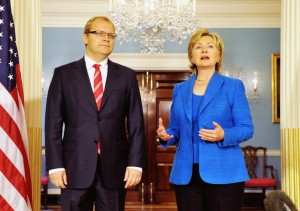TALLINN — Official reaction to the U.S. decision to rescind its planned Eastern European missile-defense shield varied greatly between the three Baltic states.
Lithuania decried the move as a betrayal of America’s eastern allies in the face of Russian pressure, but Latvia and Estonia reacted coolly to the President Barack Obama’s announcement yesterday.

Estonian Minister of Foreign Affairs Urmas Paet (left) was nonplussed about the missile-defense shield cancellation yesterday during a press conference with U.S. Secretary of State Hillary Clinton.
Estonian Minister of Foreign Affairs Urmas Paet did not mention the missile shield cancellation at all during his meeting with U.S. Secretary of State Hillary Clinton in Washington, D.C. yesterday.
Instead Paet emphasized Estonia and NATO’s continued partnership during the post-meeting press conference.
“Estonia would like to continue this close cooperation with the U.S. both bilaterally and in NATO and other international formats. Particularly in Afghanistan, where there are cooperation opportunities in the military as well as civilian sectors,” Paet said.
Instead of the threat of missiles, Paet showed more concern about cyber-security. In 2007 Estonian government websites were shut down by hackers, which Paet blamed on the Kremlin.
“One essential factor is responding to new threats, including threats in the realm of cyber-security. We should increase international cooperation in the cyber-security sector,” Paet said.
The Latvian Ministry of Foreign Affairs mentioned that the missile shield cancellation did not mean the U.S. was not addressing the threat of missiles to NATO’s eastern members.
Instead of Iranian long-range nuclear warheads, the Obama administration says it is more concerned about small to medium-range missiles launched by Iran and will start a different defense program to counter that threat. To be implemented by 2015, it may also include installing American missile bases in Eastern Europe.
“The U.S. has informed its allies in their capitals and NATO headquarters on the adjustment and enhancement to the missile-defense system. We understand the new U.S. proposal as a technological enhancement of the current anti-missile defense system,” Gints Serafinovičs, a Latvian ministry of foreign affairs spokesperson, told Baltic Reports. “Contrary to the anti-missile project to date, the new missile defense architecture, first of all, is a shield against short and medium-range missiles and envisages deploying defense against long-range missiles at a later phase.”
“Russia is winning”
The Lithuanian government’s reaction differed greatly from its Baltic counterparts. The Bush-era missile-defense shield proposal was never stated to be a safeguard against a Russian threat but rather an Iranian one.
Nevertheless, the Lithuanian government described the cancellation as a capitulation to Russian pressure. President Dmitry Medvedev announced on Sept. 1 that Russia considered former Soviet republics and satellite states to be within its “privileged” sphere of influence.
Today Lithuanian Prime Minister Andrius Kubilius told the press that the U.S. government should know that Eastern Europe needs certain safety guarantees and that the move showed this region could not count on America’s unyielding support.
“I wouldn’t want to see in our people’s eyes the position that in another way Russia is winning negotiations on who has the most influence on the actions in Eastern Europe,” Kubilius said. “Eastern Europe needs guarantees that actions made by the former U.S. administration will be continued in one or another way into the near future.”
Kubilius’ view was echoed by several Lithuanian political analysts. Unlike the Latvian foreign ministry, Kubilius said that Lithuania was not informed beforehand about the American change of plan on the missile-defense shield.












